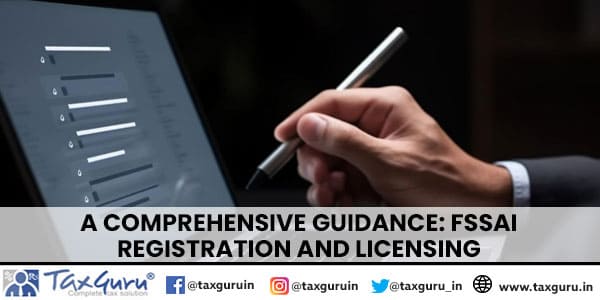Introduction
In India, where food is not just sustenance but an integral part of culture, it is essential to ensure safety of our consumables. The Food Safety and Standards Authority of India (“FSSAI”) is an autonomous body established on 5th September, 2008, under the Food Safety and Standards Act, 2006, and plays a crucial role in protecting the health of Indian citizens by regulating food safety and hygiene.
This Article details out in a comprehensive manner the entire procedure for obtaining a FSSAI Registration and Licensing.
APPLICABILITY:
The Applicability of FSSAI Registration is inclusive, and even Petty Food Business Operators are eligible to apply for a Registration, including the following:
- Manufacturer or seller of food items either themselves or via some retailer, hawker or stall vendor.
- Distribution of food in religious or social gathering, except a Caterer.
- Other Food Businesses, with an annual turnover of not more than INR 12 lakhs and those who. While the list is long, a few notifiable ones include:
1. Producer of milk, milk based products and meat and the same does not exceed 100 kg/ltr per day.
2. Vegetable Oil Processing Units with turnover of upto 100 kg of ltr/day.
3. Meat Processing Units with production of >100 kg per day or 30 MT per day.
4. Slaughtering Capacity of 2 large animals or 10 small animals or 50 poultry birds per day or less.
5. Wholesalers, retailers, distributors, and suppliers having an annual turnover of up to INR 12 lakhs.

6. Hotels and Restaurants with a turnover of up to INR 12 lakhs per annum.
7. Dhaba Owners and food vending establishments, including clubs and canteens, up to INR 12 Lakhs turnover per annum.
8. Transporters with an annual turnover of up to INR 12 lakhs.
Any concerned Food Business Operator, generating turnover more than INR 12 Lakhs or breaching the aforesaid capacity criteria, shall be liable to obtain FSSAI License with the Central/State Licensing Authority.
Note that E-Commerce Businesses, selling products online, are mandatorily required to obtain Central License irrespective of the Capacity/Turnover criteria.
FSSAI REGISTRATION PROCESS
The process of obtaining FSSAI registration is relatively easy. It involves a few key steps that businesses need to follow.
Step 1: Determine Eligibility
Before applying for FSSAI registration, it’s essential to determine the eligibility criteria based on the scale and nature of your food business. FSSAI offers three types of registrations: Basic Registration, State License and Central License, depending on the size and turnover of the business.
Step 2: Application Submission
Once eligibility is confirmed, the next step is to submit the FSSAI registration application online through the Food Safety Compliance System (FoSCoS) Portal. The application is termed as “Form-A” and should include all necessary documents, such as identity proof, address proof, food safety management plan, and other relevant certificates. Once submitted, an Unique Application ID shall be allotted to track the submitted application.
Step 3: Verification of Documents
After submitting the application, the FSSAI authorities will verify the documents and information provided. Any discrepancies or incomplete details may result in delays or rejection of the application. It’s crucial to ensure that all documents are accurate and up-to-date to expedite the registration process. The Registering Authority shall within 7 days from the date of receipt, issue, reject or order for an Inspection.
Step 4: Inspection of Premises
If the Registering Authorities deem fit, an inspection of premises shall be carried out to assess that the Applicant is maintaining proper hygiene, safety and sanitation within the premises. The Registering Authority shall act within 30 days from the date of initiation of Inspection. Prior to conduct of such inspection, the Applicant shall be intimated by way of a notice. Upon completion of the Inspection, an Inspection Report shall be shared with the Applicant, with directions to carry out changes, if any.
Step 5: Issuance of Registration Certificate
Once the inspection is completed, and the business is found to be compliant with the necessary safety standards, a Registration Certificate will be issued. This certificate serves as official approval to operate the food business and must be prominently displayed at the premises and on all cash receipts/memo/bill. The only exemption will be the GST E-way Bill and other system generated documents.
FSSAI LICENSING PROCESS:
The FSSAI Licensing process, similar to the Registration Procedure, is slightly more procedural and comprises of the following steps:
Step 1: Determine Eligibility:
Food Business Operators exceeding the INR 12 Lakhs Turnover Criteria or the capacity criteria, shall apply for State/Central Licensing.
Step 2: Application Submission:
Once eligibility is confirmed, the next step is to submit the FSSAI registration application online through the Food Safety Compliance System (FoSCoS) Portal. The application is termed as “Form-B” and should include all mandatory documents to be submitted along with. Once submitted, a Unique Application ID is allotted which can be used by the Applicant to track the submitted application.
Step 3: Verification of Documents:
Upon submission of Form-B, the Licensing Authorities shall undertake verification of the submitted documents and proceed with either granting approval or in case of Incomplete Application, further information may be required to be submitted.
Step 4: Inspection of Premises:
If the Licensing authorities deem fit, an inspection of premises shall be carried out to assess that the Applicant is maintaining proper hygiene, sanitation, storage facilities, and adherence to Good Manufacturing Practices (GMP). Prior to conduct of such inspection, the Applicant shall be intimated by way of a notice. Upon completion of the Inspection, an Inspection Report shall be shared with the Applicant, with directions to carry out changes, if any.
Step 5: Issuance of License:
The Licensing Authority has been entrusted to accept/reject the Application, basis the Inspection Report, wihin a span of thirty days from the date of receipt of the Report.
Note that before rejection of an Application, appropriate Opportunity of being heard is required to be provided to the Applicant.
Upon receipt of the License, a true copy of the same shall be displayed at a prominent place within the premises where the Operator carries on the food business.
In case the License is cancelled, Fresh Application can be made after the expiry of 90 days from cancellation.
Understanding Documentation- FSSAI Registration:
Along with the Registration Application in Form-A, the Applicant needs to submit the following documents, namely,
1. Photograph of the Applicant.
2. Proof of identity of the proprietor or partners, such as PAN card, Aadhaar card, or voter ID card.
3. Proof of address, such as electricity bill, telephone bill, or rent agreement.
4. Self-Declaration by Proprietor and declaration of existence of Food safety management System Plan.
5. Proof of possession of premises, such as rent agreement or any other Property Documents.
6. Partnership deed or Memorandum of Association, depending on the business structure.
Note that all Documents are required to be self-attested by the Applicant.
Understanding Documentation- FSSAI License:
Along with the Registration Application in Form-B, the Applicant needs to submit the following documents, namely,
1. In case the Applicant is applying for Central License, a Blue-print/Layout Plan of the Processing Unit showing the dimension.
2. List of Directors/Partners/Proprietor Details.
3. Photo Identity and Address Proof of the Applicant.
4. Water Analysis Report (Chemical and Bacteriological), further certifying the portability of water, including the name of the Authorized Representative of the Laboratory who collected the sample and the date of collection.
Note that such Laboratory must be NABL Accredited. (Not applicable if Water is not used as an Ingredient)
5. Proof of Possession of Premises– Sale Deed/Rent Agreement/Electricity Bill. The same should be notarised.
6. Partnership Deed/Affidavit/Memorandum of Association, depending upon the Business Structure.
7. Declaration of having a Food Safety Management System Plan in place.
8. Self-Declaration by Proprietor/Director/Partners.
Form IX: Nomination of Person as per Clause 2.5 of FSS Rules, 2008 (Though the same is not applicable in case of a Proprietor, in numerous situations, the Authorities demand such attachment.)
*All documents are required to be self-attested.
FSSAI Registration and Licensing Fees:
In case FSSAI Registration is sought, a nominal fee of Rs. 100/- per year is required to be paid.
The fees for FSSAI Licensing depends on the type and scale of the food business. The FSSAI has categorized businesses into three types, based on their turnover: Small-Scale, Medium-Scale and Large-Scale Food Business Operators (FBOs). The licensing fees vary accordingly.
For medium-scale businesses with an annual turnover between Rs. 12 lakhs and Rs. 20 crores, the Licensing Fee ranges between Rs. 2,000 to Rs. 5000. For large-scale businesses with an annual turnover exceeding Rs. 20 crores, the registration fee is Rs. 7,500/-.
The FoSCoS Portal can be referred to check the Fees Applicability, basis the Business and Turnover: https://foscos.fssai.gov.in/assets/docs/KindofBusinessEligibilityLatest.pdf.
Validity of FSSAI Registration and License:
FSSAI Registration is valid for a tenure of 1 year and License is valid for a tenure of minimum 1 year and extends up to 5 years, as may be chosen by the Food Business Operator.
Application for renewal of both registration and license shall be made not later than 30 days prior to the date of expiration.
Importance of FSSAI Registration and Licensing:
FSSAI registration is not just a legal obligation, but it also brings numerous benefits for Food Business Operators. Firstly, it helps in building trust and credibility among consumers. With the FSSAI logo displayed on their products, businesses can assure customers that their food has undergone stringent quality checks and is safe for consumption.
In today’s health-conscious society, consumers are becoming more aware of the importance of food safety and quality. They actively seek out products that have FSSAI registration, as it gives them confidence in the authenticity.
Further, the FSSAI provides financial assistance and incentives to registered businesses for implementing food safety management systems and adopting good manufacturing practices.
Conclusion:
In today’s evolving food industry, obtaining FSSAI Registration and Licensing has become a necessity for businesses to signify a mark of credibility and in building a strong brand image in the market.
{The Article has been authored by Antika Mukherjee, CS Management Trainee and Tiasha Chatterjee, CA Article}
For any further queries regarding FSSAI Licensing or Registration, reach out at nupuramc@gmail.com or contact at +91 9433058891.





